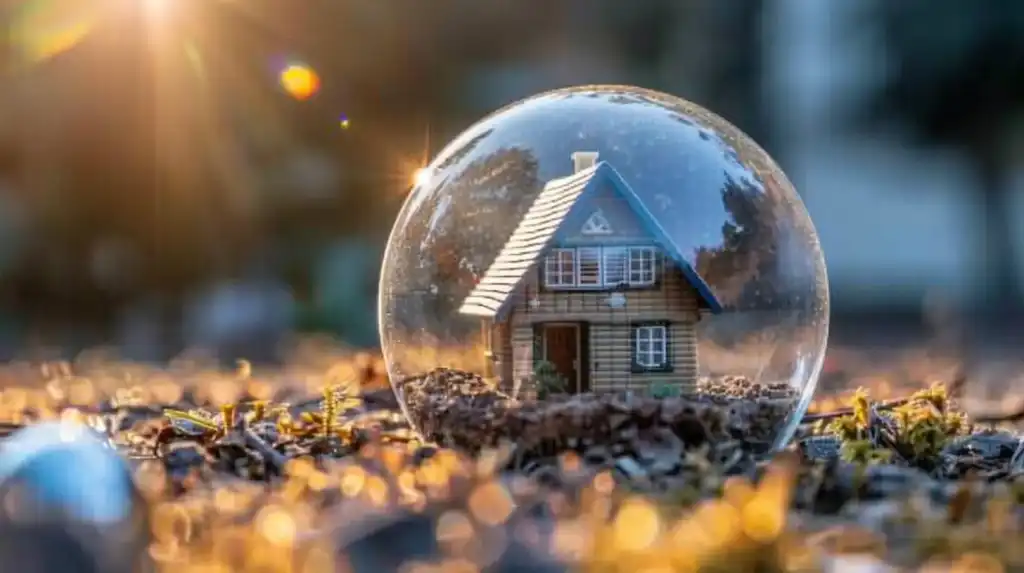21 March 2025
Real estate can be an exciting and lucrative investment. The idea of buying a property, watching its value skyrocket, and then selling it for a hefty profit sounds like a dream come true, right? But there's a phrase that sends chills down the spine of anyone who's been around the block a few times: real estate market bubble.If you've been scratching your head, wondering if the current market is too good to be true, you might be onto something. Bubbles can happen, and when they burst, they can wreak havoc on property values and the economy as a whole. But how do you spot one before it's too late?
In this article, we're going to dive into the signs of a real estate market bubble, so you can make informed decisions and avoid getting caught up in the frenzy.

What Is a Real Estate Market Bubble?
Before we get into the nitty-gritty of how to spot a bubble, let's first define what we're dealing with.
A real estate market bubble occurs when property prices rise rapidly due to high demand, speculation, and exuberant behavior. The key point here is that the price surge is unsustainable. People are buying up properties at inflated prices, often because they believe the market will keep going up indefinitely.
But here's the kicker: bubbles don't last. Eventually, demand slows down, or external factors (like economic downturns or rising interest rates) cause the market to cool off. When that happens, property prices plummet, and those who bought at the peak may find themselves underwater — owing more on their mortgages than their homes are worth.
The Anatomy of a Bubble: A Quick Overview
To better understand how to spot a real estate bubble, it's important to know how they form. Typically, a bubble follows these stages:
1. Stealth Phase: Prices start to rise, but only a few savvy investors or insiders notice. They buy early, expecting future gains.
2. Awareness Phase: More people catch on as prices continue to climb. News outlets begin reporting on the "hot" market, and more buyers enter the fray.
3. Mania Phase: This is when things get wild. Everyone is talking about real estate, prices are skyrocketing, and buyers are scrambling to get in on the action. Fear of missing out (FOMO) drives irrational behavior.
4. Blow-off Phase: The bubble pops. Prices plummet, and panic sets in. Many who bought at the peak are left with properties worth far less than what they paid.
So, how do you know if you're in the "mania" phase of a bubble? Here are the key signs to watch for.
Signs You're in a Real Estate Market Bubble
1. Rapid and Unexplained Price Increases
One of the most obvious signs of a bubble is when property prices are rising too fast, too soon, and without any logical basis. Sure, real estate values can increase over time, but in a bubble, the growth rate becomes unsustainable.
For example, if you see property prices in your area increasing by 20% or more in a single year, that's a red flag. This is especially true if there's no major economic boom or shortage of housing to justify such a spike. When prices are rising simply because everyone believes they'll continue to rise, you're likely dealing with a bubble.
2. FOMO (Fear of Missing Out)
We've all been there — that nagging feeling that if we don't act NOW, we'll miss out on something big. FOMO is a powerful driver of bubbles.
In a real estate bubble, you might notice people rushing to buy homes, even if they don’t really need them. They aren't buying because they want a place to live or because it's a sound investment. They're buying because they fear that if they don't, they'll miss out on future gains. You may hear things like, "If I don't buy now, prices will be even higher next month!" This kind of panic-buying is a classic sign of a bubble in the making.
3. Speculative Buying
Another hallmark of a real estate bubble is speculative buying. This occurs when people purchase properties with the sole intention of flipping them for a quick profit. They're not interested in long-term investment or renting out the property. They just want to ride the wave of rising prices and cash out at the top.
When you see a lot of people buying multiple properties or homes sitting vacant because owners are waiting for the "right time" to sell, these are signs that speculation is driving the market, not genuine demand.
4. Disconnect Between Prices and Local Incomes
Here's one that many people overlook: the relationship between property prices and local incomes. In a healthy real estate market, home prices generally rise in tandem with wage growth. After all, people need to be able to afford the homes they're buying, right?
But in a bubble, property prices grow much faster than local incomes. If you notice that the average home price in your area is 10 times the average annual income (or more), that's a warning sign. This disconnect suggests that prices are being driven more by speculation than by actual affordability.
5. Increase in Risky Lending Practices
Remember the 2008 financial crisis? A big part of what fueled that bubble was risky lending practices. Banks were handing out loans to people who, frankly, couldn't afford them. Subprime mortgages, low or no down payments, and adjustable-rate loans were all too common.
Fast forward to today, and while lending standards have tightened since then, you still need to be on the lookout for relaxed lending practices. If you see banks offering low-interest loans with minimal qualification requirements, or if you hear about buyers taking on massive mortgages that stretch them to their financial limits, it's a sign that the market might be overheating.
6. Overconfidence in the Market
Ever hear someone say, "Real estate always goes up!"? That's a dangerous mindset. While real estate has historically appreciated over the long term, it doesn't mean prices will rise indefinitely or that there won't be market corrections.
When you notice that people (and investors) are overly optimistic and confident that prices will continue to rise forever, it's a clear sign of irrational exuberance. This kind of blind faith in the market is often a precursor to a bubble.
7. Media Hype
If you can't turn on the TV, scroll through social media, or open a newspaper without seeing headlines about the "booming real estate market," it might be time to pause and think. When the media starts hyping up a particular market, it often fuels even more speculative buying and FOMO.
In a bubble, the market becomes a hot topic of conversation. Everyone from your neighbor to your hairstylist is talking about how much their home has appreciated. When real estate becomes the talk of the town, it might be time to take a step back and assess whether the hype is justified.
8. Surge in New Construction
During a bubble, builders and developers often scramble to meet the seemingly insatiable demand for housing. As a result, you'll see a surge in new construction projects. While new construction isn't inherently bad, it can lead to an oversupply of properties if demand suddenly dries up.
If you notice a lot of new developments popping up in your area — especially luxury condos or high-end homes — be cautious. If the market slows down, those properties could sit empty, leading to a sharp decline in prices.
What Happens When a Real Estate Bubble Bursts?
Okay, so you've spotted the signs of a bubble. But what happens if it bursts?
When a real estate bubble pops, prices can fall dramatically, often within a short period. Homeowners who bought at the peak may find themselves underwater, meaning they owe more on their mortgage than their home is worth. This can lead to foreclosures, bankruptcies, and a slowdown in the housing market.
Even worse, a bursting bubble can have ripple effects on the broader economy. The 2008 financial crisis is a prime example of how a housing market crash can lead to widespread economic turmoil. While it's impossible to predict the exact consequences of a bubble bursting, it's safe to say it won't be pretty.
Conclusion: Stay Informed and Cautious
Real estate bubbles can be tricky to spot, but if you keep an eye on the warning signs — rapid price increases, FOMO, speculative buying, and a disconnect between prices and local incomes — you'll be better equipped to make smart decisions.
Remember, the key to surviving (and even thriving) in a volatile market is to stay informed, avoid panic-buying, and always do your homework before making a purchase. While no one can predict the exact moment a bubble will burst, recognizing the signs can help you avoid being caught off guard.
After all, it's better to walk away from a potential bubble than to get swept up in the mania, only to be left holding the bag when it all comes crashing down.


